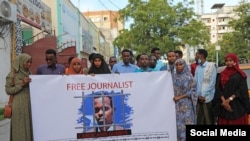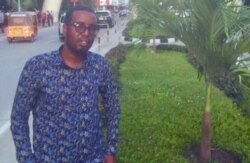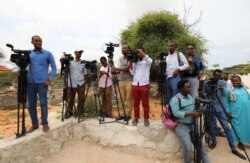Somalia’s prime minister has classified media as an essential service during the COVID-19 pandemic, but at least four journalists have been briefly detained over their coverage.
As of Friday, Somalia had 80 confirmed coronavirus cases and five deaths and authorities have imposed a nighttime curfew in Mogadishu, where most of the cases were recorded.
Journalists covering the virus, including reporting on the availability of personal protection equipment or traders allegedly smuggling in goods during the quarantine have been detained and in some cases forced to drop their stories.
Somalia is one of the most dangerous countries for journalists. A report by the London-based rights group Amnesty International found media at risk from al-Shabab and the government over coverage, and at least eight journalists have been killed since President Mohamed Abdullahi Farmajo came to power.
But observers say the pandemic has brought additional challenges.
“What we have seen recently is quite different,” said Abdalle Ahmed Mumin, secretary general of the Somali Journalists Syndicate.
It is “a new version of repression and intimidation by the government to censor journalists reporting COVID-19,” Mumin told VOA.
Mohamed Dhaysane Moalim, a freelance journalist working for the Turkish news agency Anadolu, said that being a journalist in Somalia hasn’t been easy and that he and his colleagues face “harassment, intimidation and even jailing” for covering the coronavirus.
“I wrote a story about Somalia sending doctors to Italy, and an official from the Villa Somalia (presidential palace) reached me via Twitter asking me where I got the sources, even though I mentioned my sources in the story,” he told VOA.
In recent weeks at least four other journalists have been harassed or detained.
On Tuesday, Mogadishu police arrested Abdiaziz Ahmed Gurbiye, an editor and deputy director of the privately owned Goobjoog Media Group, after he was summoned by the police department, according to the New York-based Committee to Protect Journalists (CPJ).
The following day, state prosecutors accused Gurbiye of spreading false news and offending the honor of the president.
Mahad Salad, a member of the Somali parliament, said in a Facebook post that Gurbiye’s arrest was related to a social media post in which the journalist alleged that a hospital ventilator was transferred to the office of the Somali president.
Goobjoog defended its journalist in a statement. It condemned the arrest and said it views Gurbiye’s detention as “a planned campaign to suppress the media.”
Gurbiye’s lawyers say he denied the charge. He remains in jail awaiting trial and, if convicted, could face up to three yours in prison for “offending the honor” of the head of the state, according to Article 220 of Somalia’s penal code.
Separately, Adan Mohamed Salad of Somali National TV was detained briefly in the southern coastal town of Kismayo on Monday while reporting on smuggling of khat into Somalia, the Somali media watchdog SJS said.
After his release, Kismayo officials ordered Salad to drop the story, the SJS said.
And last month, Mogadishu police briefly detained and harassed TV reporter Abdullahi Farah Nur and attacked his cameraman Abdirahman Omar while they were conducting interviews on a shortage of masks and gloves in the local markets, the SJS said. Nur and Omar work for Somali Cable TV.
The Somali embassy in Washington did not return VOA’s calls requesting comment.
Mumin, of the SJS, said the pandemic has led to new attempts by the government to repress and intimidate journalists.
“This is a new tactic because instead of educating the public and providing the information about the coronavirus, the government is trying to curb the flow of information necessary to inform the public,” he said.
Mumin said that while the Somali government has refused to release important details about coronavirus, local journalists are trying to investigate and inform the public, including on measures authorities are taking.
“I have seen journalists reporting [from] every corner of the country and trying to explain every angle of COVID-19-related information,” he said.
The report by Amnesty in February said attacks on journalists in Somalia by government security forces and militants were increasing.
In addition to physical attacks, the report said that harassment, intimidation and pressure on journalists in Somalia have turned the country into one of the world’s most dangerous places for the media.
Adotei Akwei, Amnesty USA’s deputy director for advocacy and government relations, said the COVID-19 crisis has put a spotlight on access to information throughout Africa.
“Freedom of expression in Somalia … has been terrible over the past two years, and authorities need to allow journalists to have unfettered access to information particularly during this COVID crisis,” he told VOA, adding that “all the detained journalists must be released.”
“The ability of Somali journalists to do their work and inform the public is more critical than ever,” Akwei said.
VOA’s Somali Service contributed to this report.






